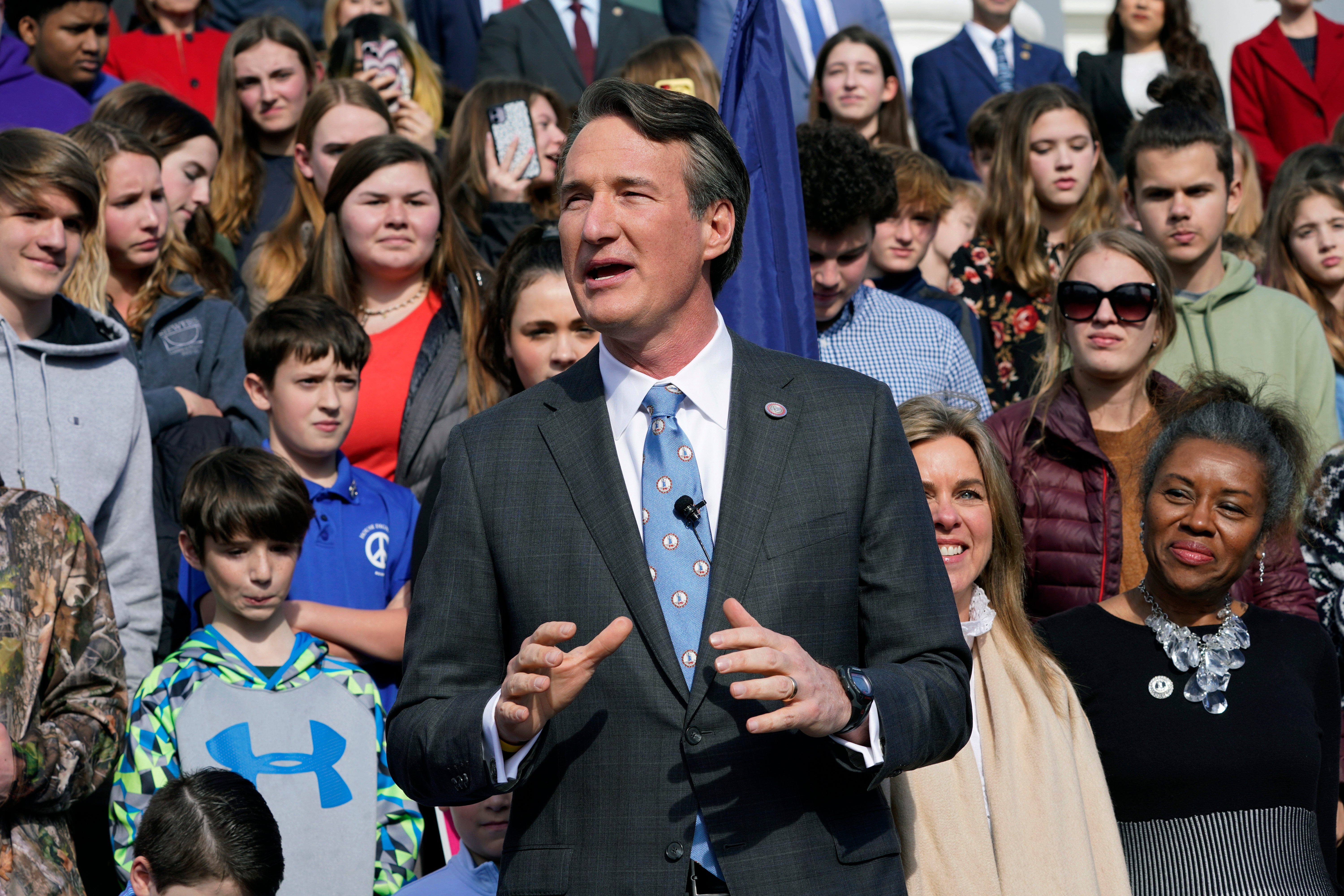Virginia education tip line sees concerns from parents
Virginians have used a tip line that Republican Gov. Glenn Youngkin set up to submit concerns about curriculum, remote learning, controversial books, mask policies, teachers and other topics

Your support helps us to tell the story
From reproductive rights to climate change to Big Tech, The Independent is on the ground when the story is developing. Whether it's investigating the financials of Elon Musk's pro-Trump PAC or producing our latest documentary, 'The A Word', which shines a light on the American women fighting for reproductive rights, we know how important it is to parse out the facts from the messaging.
At such a critical moment in US history, we need reporters on the ground. Your donation allows us to keep sending journalists to speak to both sides of the story.
The Independent is trusted by Americans across the entire political spectrum. And unlike many other quality news outlets, we choose not to lock Americans out of our reporting and analysis with paywalls. We believe quality journalism should be available to everyone, paid for by those who can afford it.
Your support makes all the difference.Virginians have used an education tip line Gov. Glenn Youngkin set up to submit concerns about curriculum, remote learning, books, mask policies, teachers and other topics, according to a sampling of emails provided to news outlets as part of a settlement agreement.
Some positive feedback was included in the batch of approximately 350 documents provided this week to news outlets that sued the Republican governor in April seeking disclosure of the information. But the majority of emails expressed anger or frustration with teachers, administrators and school policies, particularly with COVID-19 protocols.
“My children are given busy work, with no new material being taught,” a parent from Spotsylvania County wrote in February, objecting to the number of remote learning days at her child's high school.
Another parent wrote to the principal of her child's school, copying in the tip line address, asking her to provide lesson plans and lesson objective sheets from her child's 7th-grade teachers.
The parent wanted to ensure their child wasn't “being taught divisive concepts (or in Biology not being taught divisive gender-bending LGBT-campaigns with overly-sexualized lesson content).”
The parent, whose name was redacted from the email, said it was only because of remote learning during the pandemic that parents discovered the school board's “secret leftist, politically motivated agenda and Critical Race Theory -CRT brainwashing.”
Another parent objected to pay raises given to teachers.
“Though teachers did not step foot in the classroom during the 2020-2021 school year, the district allocated a whopping $32.7 million to give educators additional pay,” he wrote.
Youngkin, who campaigned heavily on education and a promise to give parents more sway in their children’s curriculums, introduced the tip line soon after he was inaugurated in January. That same month, he touted it during an interview as a way to ensure that his administration was aware of what was happening at the school level and enable it to “catalog” and “root out” instances of divisive practices.
A teachers union, Democrats in the General Assembly, some parents and other observers — including celebrities who caught wind of the tip line as it drew national news coverage — criticized the move as divisive, authoritarian and unfairly targeting educators.
Many of the emails to the tip line were supportive of Youngkin's approach to education policy.
Mital Gandhi, a parent from northern Virginia, said he initially wrote to local education officials after he discovered that his school district eliminated Algebra I from the list of classes 6th-grade students could take.
Gandhi said he followed up with an email to the tip line and the Virginia Department of Education. A department administrator responded and said the state was not prohibiting local school systems from allowing 6th-graders to take Algebra I. Gandhi said his son and several other students in 6th grade are now taking the class.
Gandhi wrote that the tip line was a way of "leveling the playing field for parents and students.”
“What Gov. Youngkin has done is he has put more power to the parents,” he said.
One person disagreed with Youngkin's approach and used the tip line to urge him not to ban “critical race theory” or controversial books.
“Please do not move us away from progress by supporting these backward notions of forward motion,” wrote one woman, who did not say whether she was a parent with children in the public school system.
News organizations filed requests for records related to the tip line, but the governor’s office had declined to provide them based the administration’s contention that the emails were “working papers and correspondence” of the governor’s office and thus not required to be disclosed under the Virginia Freedom of Information Act.
Youngkin and other governors have made routine use of the working papers exemption to withhold a wide range of records.
“The Governor wants constituents to be able to reach out to him without fear that their communications will not be kept confidential,” Macaulay Porter, a spokeswoman for Youngkin, said in a statement.
A coalition of news organizations filed suit in April, alleging Youngkin was violating the public records law.
The news organizations reached a settlement agreement with Youngkin last month that called for the Department of Education to produce about 350 documents in its possession that included emails sent to the tip line. The governor’s office was not required to hand over documents sent to its office.
“This Settlement Agreement is entered into as the result of a compromise solely for the purpose of avoiding additional expenses and the risk of further litigation. It should not be construed as adopting or rejecting the position of any Party to the litigation,” the settlement agreement says.